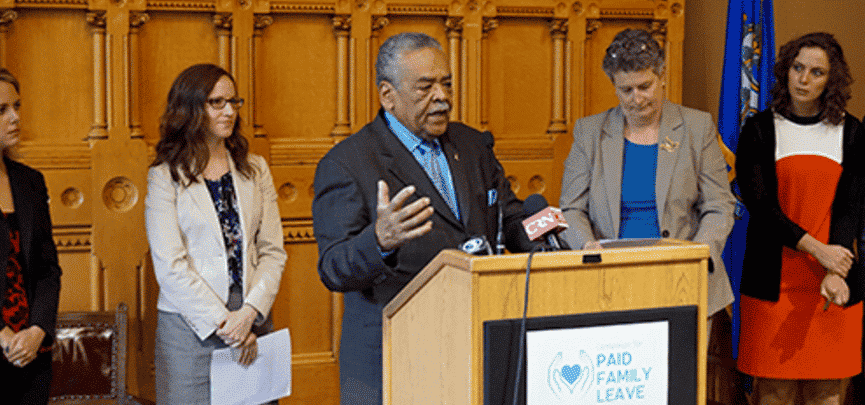Value All Care and Every Family

You seldom see legislators tear up as they argue for a piece of legislation. But that’s what happened recently when Connecticut state senators made the case for a paid family and medical leave bill, leading with stories from their own lives. Sen. Catherine Osten talked about the agony of having been a single mother working two jobs without the time she needed to help her child heal after sexual molestation. Sen. Gary Winfield described what it meant that he was able to help his mother when she was dying. Others talked about caring for a grandparent or an ailing sibling. They seemed surprised and moved by the power of their colleagues’ remarks. Sen. Edwin Gomes noted that providing care is “the most valuable thing [people] can do for their families because that’s what keeps families together.”
We need to be sure that any paid leave plan does not exclude all the loved ones these legislators described. A broken hip, heart attack, cancer – life happens to those we love and to ourselves. As Sen. Winfield put it, “It’s a story about all of us.”
Caring for a loved one or a personal illness, in fact, makes up more than three-quarters of the leaves people take under the Family and Medical Leave Act (FMLA) —the law that guarantees unpaid leave. As a nation, we need to value all kinds of care and all kinds of families. The FMLA itself has a narrow definition of family as only your own parents, your married spouse and your children; we need one that recognizes our nation’s wide diversity of families. The plan must be comprehensive in order to cover everyone who will pay into the program. It should take into account the growing numbers of seniors who require care, the needs of military families, and the boost to family stability, health and economic security when people are able to get adequate treatment for their own health. We also need a progressive wage replacement system, like the ones several states are now developing, to ensure the lowest-paid receive all or most of their pay so leave is a realistic option.
Those in the trenches fighting for paid leave are heartened to see growing acknowledgment of the need for such a program, including among conservatives. Recently a diverse group of experts at the American Enterprise Institute and Brookings concluded that paid family and medical leave is “an issue whose time has come.”
Like the coalitions in our network, the AEI-Brookings Paid Family Leave Working Group calls for leave that is gender-neutral and job protected and relies on a sustainable funding source. The Working Group sees the value of a social insurance program that pools small contributions, rejecting tax credits or existing state unemployment insurance funds as unreliable and inequitable sources of funding.
Unfortunately, the plan they agreed to is limited only to parents of new children. As such, it excludes all the care situations described above. The narrow focus would also likely increase discrimination against women. Even though fathers are included, the ACLU has pointed out that employers will assume women are more likely to take parental leave and that could influence hiring and promotion. That’s why Congress made sure the FMLA was not only gender-neutral but included time for self-care. The ACLU notes Justice Ruth Bader Ginsburg’s forceful argument in Coleman v. Court of Appeals of Maryland: including self-care was intended “to blunt the force of stereotypes of women as primary caregivers by increasing the odds that men and women will invoke the… leave provisions in near-equal numbers.”
While their report focuses on paid parental leave, the AEI-Brookings Paid Family Leave Working Group explicitly points to the need for paid time to care for a serious personal or family member’s illness and intends to research ways to include such leaves in a final plan. The majority of the group agrees that the minimal number of weeks of leave should be 12 rather than 8.
We are confident that we can win bipartisan support for a program that meets our Triple A rating – accessible, affordable and adequate. We look forward to working with the AEI Brookings Working Group on the ways to get there. Because, as Connecticut State Senator Osten put it, “Our hearts are torn apart when we can’t be there for our families.”